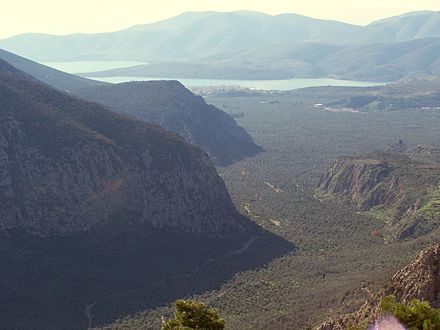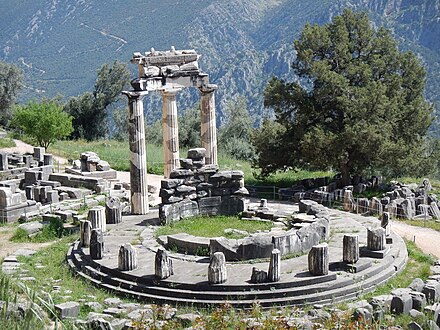Delphi - ancient town in Greece
The archaeological site of Delphi is an UNESCO World Heritage site near the modern village of the same name in Greece, on the southwestern slope of Mount Parnassus, which is part of a mountain range north of the gulf of Corinth. In ancient times, it was the site of the most important oracle of the god Apollo. The site of the Oracle was first excavated in the 1890's, and ongoing excavations and reconstruction has continued since then.
Understand
Delphi was revered throughout the Greek world as the site of the ομφαλός (omphalos) stone, the centre of the universe. In the inner ἑστία (hestia), or hearth, of the Temple of Delphic Apollo, an άσβεστος φλόγα (eternal flame) burned. After the battle of Plataea, the Greek cities extinguished their fires and brought new fire from the hearth of Greece, at Delphi; in the foundation stories of several Greek colonies, the founding colonists were first dedicated at Delphi.
The Oracle was always a woman. In the early history of Delphi, this was a virgin woman from one of the local villages, but as time passed, this person changed to be an older woman, typically past menopause. The woman was titled Pythia, and the words she uttered in her trance state was unintelligible. Pythia would be sitting on a high platform, inhaling vapors. Researchers today think that these vapors are associated with petrochemical effusions naturally occurring at the site. There was a priest who "translated" the prophesies, and was the one who actually conveyed the prophesy to the person / people seeking it. Modern day analysis indicates that the prophesies employed the standard techniques of fortune tellers everywhere: they were vague enough that no matter what the future turned out to be, it was always interpretable as being consistent with the prophesy. People came to the Oracle with a wide range of questions. A common question from city states would be about whether to go to war or the outcome of a war that they were engaged in. Individuals often asked about relationships. The accuracy of the Oracle was also aided by their intelligence gathering apparatus. Visitors to the site would often bring in news of far away places, which helped in giving the right advice to prophesy seekers. At the entrance to the site, visitors were always engaged with to find out who they were, whether they had come to Delphi before, seeking advice, and if so, what the previous prophesy had been.
People did not pay for the prophesies. They paid for the animals that were sacrificed to Apollo at the site.
The site was a collection of various buildings - many of them commemorative - built by people who were grateful for prophesies that turned out well for them. The Siphnian Treasury building, for example, was constructed by the people of the tiny island of Siphnos. They were undergoing a drought and were about to abandon their island. They journeyed for many months to Delphi - during which, gold was discovered on the island. News of this discovery had reached the Oracle before the islanders reached there, and so the prophesy given them simply asked them to stay where they were. When the islanders went back to Siphnos, they heard of the discovery of gold, and thus, to them, the prophesy seemed miraculous.
The foothills of Mount Parnassus are covered with an estimated nine million olive trees - some of these trees being many hundreds of years old.
Get in
By bus
There are several companies offering day trips from Athens to Delphi, prices varying from €80 to €100. To save money, you can easily organise your own day trip utilising Athens long distance buses. The journey takes about 3 hours. One-way fare: €15.10 (return ticket also available). Seats are numbered.
Buses leave several times a day from Bus Terminal B. Finding this terminal is a bit tricky, as it is not on a main road and local buses do not stop there. You can take a bus to Liosion Street and get out around number 260. Then walk to parallel street Agiou Dimitriou Oplon. Use Google Maps Public Transport to find buses to 260 Liosion St.
It is recommended to buy bus (return) tickets to Delphi one day in advance, so you are sure they are not sold out and that you can find the bus terminal on time.
Daily times to Delphi from Athens are: 07:30, 09:30, 10:30, 13:00, 15:30, 17:30, 20:00 (only Friday and Sunday)
Return: 05:30 (not Sat. and Sun.), 07:15 (only Sat. and Sun.), 09:00 (not on Sunday), 11:00, 16:00, 18:00
Consult the bus schedule, times may change.
By car
While you can drive to Delphi, the hairpin turns will keep you from paying attention to the breathtaking scenery. Also, one you get there, finding a parking space, and navigating the traffic jams on the narrow roads will test your patience. You are better off letting someone else drive you.
Get around
The modern town of Delphi is small enough that walking is really the only means of transportation required. The museum and archaeological site are both in walking distance from the town. Taxis however are readily available.
There are no restrooms at the archaeological site. The museum, which is close by, and which houses many of the results of the excavations and restoration, does have food and restrooms. The archaeological site is in the open air; you will have to deal with the weather appropriately in order to enjoy your visit. Prepare for the hot sun and tourist crowds in the summer months.
See

- Museum, 38.48024°, 22.49969°, +30 22650 82313, iepka@culture.gr. 08:00 - 15:00 (summer 20:00). Delphi is all about the hellenic culture and the remaining ruins. The downside are the opening hours of the Sanctuaries. Only during the summer heat, the place is open until 20:00. Better arrive early or stay the night before in a place nearby. From 10:00 the sanctuaries is full with classes and package tourists. Adult €6, child €3
- Ancient Theater, 38.48255°, 22.50046°. 2016-03-09
- Temple of Apollo, 38.48229°, 22.50118°. 2016-03-09
- Delphi Stadium, 38.48246°, 22.49766°. 2016-03-09
- Sanctuary of Athena with the Tholos, 38.48015°, 22.50791°. Free 2020-11-19
Do
The region of Delphi is typically Greek countryside: mountainous, with narrow roads. It's nice for hiking and cycling, especially in spring and fall as summer is really hot. Some hostels rent bikes.
- Polytropon Art (Polytropon Art Ceramic Art workshop), Athanasiou Diakou 45, +30 6986108710, info@polytroponart.gr. Polytropon Art is an ceramic art workshop established at Delphi since 1986. Specialising in museum copies of Greek pottery, The result is authentic and diverse works, that are simultaneously decorative and useful everyday objects, since the raw materials used to construct them are completely natural, non toxic and are food safe. 2016-08-20
:The man behind Polytropon Art (Aristotelis) offers a ceramics workshop as an airbnb experience. Lessons take place at the workshop and are open to anyone interested in learning about Greek ceramics, from beginners to advanced ceramists.
Buy
There is a gift shop at the museum which offers items for sale which are related to the archaeological site. The shops in the modern village of Delphi are more focused on the regular tourist.
Eat
There are quite a few eating options at the modern village. The larger hotels in the area can have onsite restaurants as well.
Drink
- Astra Cafe & Restaurant (Astra), Dimou Fragou 4, 38.47962°, 22.4911°, +30 697 540 4050, parnassosgr@gmail.com. 7AM - midnight. Coffees, fine wine, beers and cocktails, along with Mediterranean & Greek cuisine, in a beautiful place with a nice view. 2022-03-21
Sleep
Most hotels in Delphi are a bit run down as most guests only stay for one night before they visit the archaeological sites. Package tourists are the main source of income and prices start at €20 per night. Most mid-range hotels charge €50-70 per night for a double room. Check if internet and/or breakfast is included. Hotels are booked well during the weekend and at public holidays (e.g. Easter). Arachova and Galaxidi are under 30 minutes away and good value options to avoid the package tourists.
- Fedriades Hotel, 46 V.Pavlou & Friderikis str., 38.47887°, 22.49375°, +30 22650 82370. Fedriades Delphi Hotel a few of the rooms overlook the Corinthian Gulf and the olive groves of Itea
- Orfeas Hotel, 35 Iphigenias Singrou St., +30 2265 082077. Check-in: 12:00, check-out: 12:00. Budget hotel just up the hill from the main town. Clean rooms, with doubles available to single travellers for €20, with bathroom. No wireless, breakfast available for extra. €20
- Hotel Leto, 15 Apollonos St, +30 22650 82302. Check-in: 12:00, check-out: 11:00. 800 m from the archaeological site. It's a modern hotel with a view of the city of Itea and the Corinthian gulf.
- Pithos Hotel, 40A Fokida, +30 22650 82850. €45
- Hotel Lefas, Pavlou & Freiderikis 17 (across the street from the post office), 38.47846°, 22.49470°, +30 2265 082324, lefashotelrestaurant@hotmail.com. Check-in: 12:30, check-out: 11:00. Featuring views of the Korinthian Gulf, this traditional hotel-restaurant offers a restaurant with fireplace and a lounge, and features air-conditioned rooms. The rooms feature private bathrooms with hairdryer, TV, fridge and heating, and family rooms are available. Pet friendly. Breakfast is served daily. Also features a guest computer with internet access, and free public parking is available close by. 2019-08-28
Go next

- Visit the nearby Arachova villages and also Parnassos Mountain during the winter season for skiing. If you have your own car drive up to Galaxidi, a seaside traditional Greek town about 40 minutes away.
- The world heritage list Osios Loukas monastery, about 20 km southeast near the town of Distomo.
